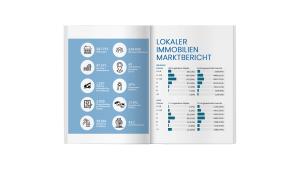Nowhere in Germany is living space as popular as in Berlin. The German capital can hardly cope with the enormous demand at the moment. In addition, more and more foreign investors are buying residential properties in Berlin, which is driving up prices. Whether it’s buying an apartment or a house in Berlin – real estate in Berlin is more popular than ever and an excellent investment.
There for you at numerous locations in Berlin
As one of the leading brokerage companies, we are represented in Berlin and have excellent regional and international networks. We offer our clients a full range of services supporting the purchase, sale and rental of real estate in the capital. If you are looking for a professional real estate agent in Berlin who will help you with your concerns, you have come to the right place. Our experienced real estate agents in Berlin have a deep understanding of the local market and are well informed about current trends and developments. Sie möchten wissen, was Ihre Immobilie wert ist? Nutzen Sie unsere Online-Immobilienbewertung für eine schnelle Analyse. For a detailed assessment, we recommend a professional market value determination by certified independent real estate appraisers – free of charge and without obligation for owners. We are excited to meet you personally. Your competent real estate agent in Berlin
Selling property in Berlin: We know the market value of your property
Are you thinking about selling your property in Berlin? Our real estate experts are available to you at any time for individual advice and will provide you with a competent market price estimate for the valuation of your property. We create an exclusive marketing strategy for each property, including a tailor-made marketing concept. Regular reports on the sales status of your property inform you about current viewing appointments until the right buyer is found. In addition, we support you with our technical know-how in upcoming contract negotiations as well as with a comprehensive after-sales service. Of course we are also happy to help you with the rental of your property.
Buy or rent a property: We will find your dream property in Berlin
Whether Berlin Mitte, Berlin Prenzlauer Berg, Berlin Charlottenburg, Berlin Grunewald, Berlin Friedrichshain, Berlin Kreuzberg or Berlin Neukölln – we will find real estate for you according to your individual ideas, such as a house, apartment, villa or dream house for the whole family in a central location. We currently have numerous properties in Berlin on offer. We are happy to help you with your search. Current real estate offers in Berlin
Selling a property with the support of a real estate agent
The Berlin real estate agents from FLEXMAKLER support you both in selling your property and in the search for a house or a condominium. If you would like to sell your property, the broker will discuss your property and your requirements in a personal meeting with you and then evaluate your property in the next step. For this it is important that the real estate agent has local market knowledge and experience in real estate sales. Based on the sales prices achieved for comparable properties in a similar location, the current condition of your property and the general market development, you will receive an individual market price estimate for your property.
In addition, the real estate agent will present you with a marketing strategy including various marketing measures: for example, a high-quality exposé including unique photos of your property, advertisements for daily and weekly newspapers with a wide reach, an advertisement in the Grund glossy magazine Enough as well as the best placement in real estate portals and social networks. In addition, FLEXMAKLER offers 360-degree online inspections and drone videos of your property. Weekly reports keep you informed about the current marketing status of your property. These give you information about customer inquiries and agreed viewing appointments. Your personal contact person is available to answer your questions at any time during the entire marketing process.

























